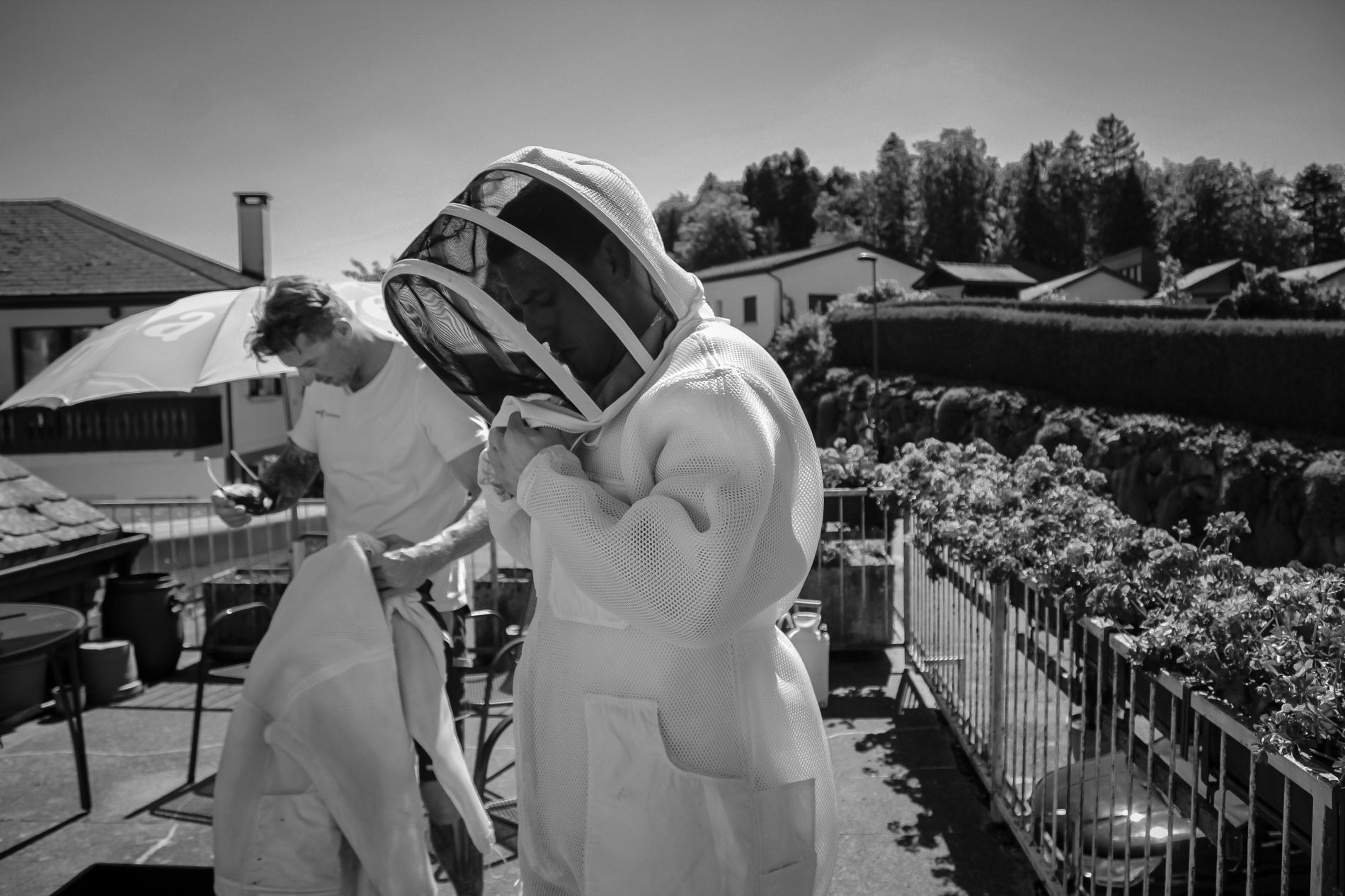
Fighting Asian hornets in Hellsau
Have you discovered an Asian hornet's nest? We'll be on site quickly! Call now - Daily Mon-Sun 07:00-21:30. Contact us now: 058 510 22 54
Having the Asian hornet's nest removed
Vespa velutina, a species of hornet hailing from South-East Asia, has rapidly spread to Switzerland and surrounding regions through invasive means. Though they do not pose a direct threat to humans, these hornets have garnered a reputation for preying on honey bees, sparking fear among beekeepers. A small group of these hornets are capable of eliminating an entire bee colony in just a few hours. If you have discovered a hornet's nest on your house, patio, shed, or in your blind box, contact our experts for hornet nest removal in Hellsau!
Use the uncomplicated telephone service of the Hornet experts in Hellsau and simply inform us at 058 510 22 54, we will be on site quickly so that you and everyone in your area feel completely safe again.
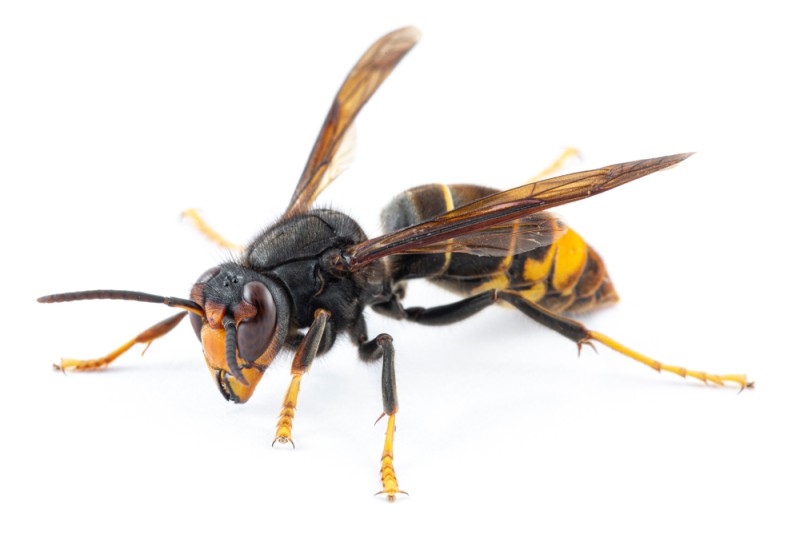

Appearance of the Asian hornet
Here are some characteristics that distinguish the Asian hornet:
1. Size: The queen can reach a length of about 3 cm, while the workers are slightly smaller and measure about 2.5 cm.
2. Color: The Asian hornet has a dark body that is almost black, with a yellow stripe at the back of the abdomen. Its face is orange-yellow.
3. Wings: The wings are dark and almost smoky gray.
4. Legs: The hornet has yellow tips on its legs, which is a striking distinguishing feature when it flies.
5. Nest: The Asian hornet's nest is often high in the trees, but it can also be found underground or in tall structures such as chimneys. It has an oval shape and is made of chewed wood, which gives the hornet a papery texture.
It is important to distinguish the Asian hornet from the European hornet (Vespa crabro), which is more harmless and a natural part of the European fauna. If you suspect you have found an Asian hornet nest near you in Hellsau, you should report this to the local authorities, or using our reporting form, as they can spread quickly and be harmful to bees and other insects. To avoid being attacked by the flying inhabitants, you should hire a professional pest controller such as the Hornet Experts Hellsau. We can identify the nest beyond doubt and take further steps to remove the Asian hornets professionally.
News about the Asian hornet in Hellsau
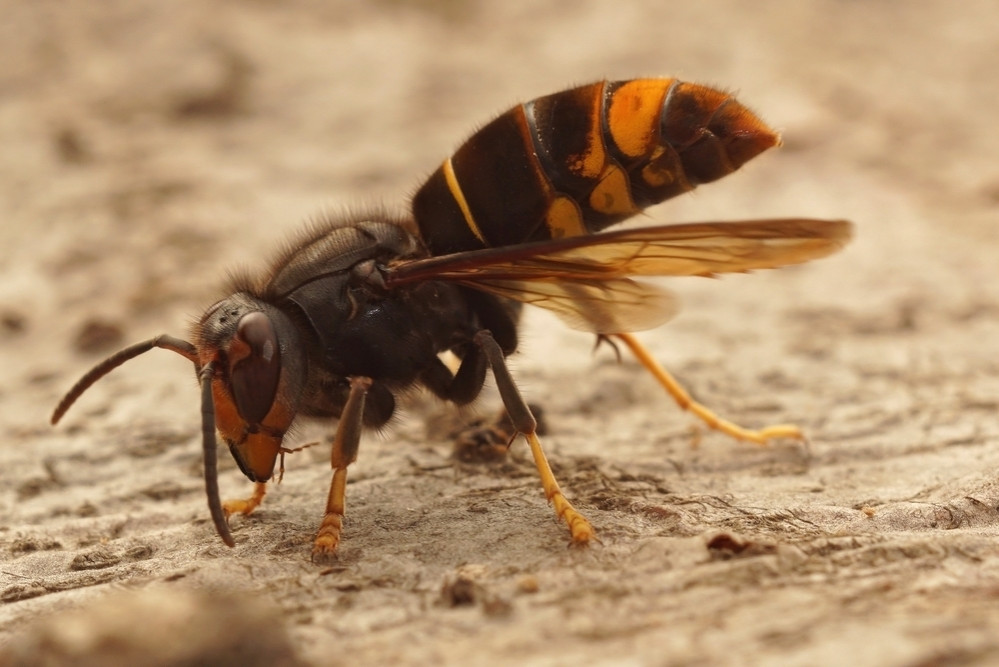
02.12.2025 Western Switzerland: Killer hornet eats bees
The territory of the Asian killer hornet has expanded considerably this year, with a notable increase reported in western Switzerland. This invasive species poses a significant threat to native bee populations, as bees make up the majority of its diet. The potential consequences are serious. Moreover, the hornet represents a danger to individuals with allergies to its venom.
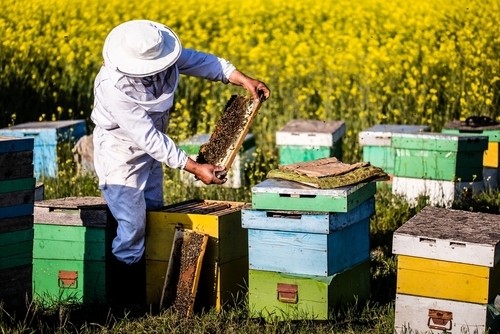
25.11.2025 Serious concerns about the bee population!
Asian hornets are inflicting significant harm on beehives across multiple parts of Europe, as reported by local beekeepers. Even a small number of hornets can destroy an entire bee colony within hours. This sharp decline in pollinators could have serious consequences for pollination, local ecosystems, and agricultural productivity.
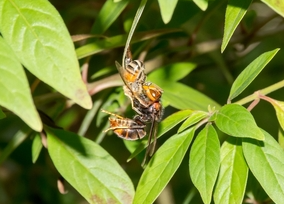
18.11.2025 Asian hornet doesn't just eat bees!
The danger it presents to insects is substantial!
The Asian hornet feeds largely on honeybees—up to 85 percent of its diet—alongside beetles and flies. This high level of predation not only poses difficulties for fruit growers but also further threatens already vulnerable bee populations.
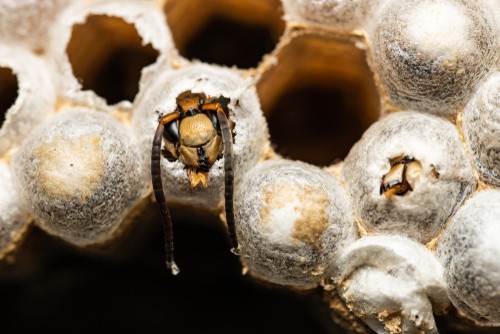
11.11.2025 How did the Asian hornet get to Europe?
The Asian hornet likely arrived in Europe unintentionally and has quickly expanded throughout France and nearby countries. Its adaptability to different environments and the absence of natural predators have contributed to its rapid spread. A single nest can generate several hundred new queens in one breeding season.
Asian Hornet Reporting Form
Please fill out all required fields and submit the form.
Help us!
If you discover an Asian hornet or a nest of this invasive species in Hellsau, it is of the utmost importance that you report it immediately. The Asian hornet is not only dangerous to humans, but also poses a serious threat to native bee populations and the ecological balance in Switzerland.
Why is it important to report the find?
With its successful colonization in specific areas, the Asian hornet exerts a significant influence on the native insect population, honey bees being particularly affected. Preying on bees, these hornets contribute to a decrease in pollinator populations, thereby disrupting the natural balance of local plant life and agricultural sectors. By reporting sightings, experts can react quickly, remove the hornets or their nests and thus prevent the spread of this invasive species.
Notification form for sightings
Our aim is to regulate the burgeoning population of the Asian hornet in Switzerland, while ensuring the preservation of our native insect species. We kindly request that you report any suspicions or sightings using our specialized reporting form. Your cooperation is essential in enabling us to promptly address this threat and limit the proliferation of this harmful species within our ecosystems.
Your contribution is crucial in the fight against the Asian hornet in Hellsau. Together we can protect nature and maintain the balance of our ecosystems;
Thank you for your vigilant attention and your commitment to protecting our environment.
How dangerous is the Asian hornet?
The Asian hornet (Vespa velutina) is a predatory insect that originated in Asia and has spread in recent years to various parts of Europe, including France and now also Switzerland and in Hellsau. Although it poses a threat to honey bees and native biodiversity, it is generally no more dangerous to humans than other wasp species. Nevertheless, there are some aspects to be aware of:
1. Threat to honey bees: The Asian hornet preys on honey bees, threatening native bee populations. A decline in bees can have a negative impact on pollination and thus on local flora and agricultural production.
2. Stings: As with other wasp and hornet species, the stings of the Asian hornet can also be painful. For most people, the stings are unpleasant but not dangerous. However, people who are allergic to wasp or hornet stings can suffer a severe allergic reaction, which in the worst case can lead to anaphylactic shock.
3. Aggressiveness: Although the Asian hornet is not necessarily more aggressive towards humans than other wasp species, it can become aggressive if it feels threatened, especially near its nest.
4. Ecological effects: Apart from the direct effects on honey bees, the spread of the Asian hornet can also disturb the ecological balance by affecting the populations of other insects.
It is vital to make a clear distinction between the Asian hornet and the Asian giant hornet (*Vespa mandarinia*) to avoid any misunderstandings. The giant hornet, also called the "killer hornet," is considerably larger and presents a potentially greater threat to humans due to its potent venom and the size of its sting.
If you have discovered a nest, call us immediately: 058 510 22 54
Our hornet professionals in Hellsau are certified by the VSS.
Frequently Asked Questions About Asian Hornets in Hellsau
Notably more hazardous than the majority of other hornet species, the Asian hornet has the capacity to inflict stings that can result in potentially serious or even fatal outcomes.
Reaching lengths of up to 3 cm, the Asian hornet presents itself as a large stinging insect. Its narrow, ebony body showcases a striking tapestry of vibrant orange, yellow, and black stripes.
While generally exhibiting a reserved and peaceful demeanor, the Asian hornet displays increased activity and aggression in defense when subjected to threats and trapped in a corner.
It is important to note the harmful effects of the venom carried by the Asian hornet, as it can cause painful bites and elicit allergic reactions in humans.
The Asian hornet's poisonous sting is the cause of its danger. Its potency exceeds that of other wasps, resulting in heightened pain and an increased risk of allergic reactions.
If you come across an Asian hornet and wish to report it, it is necessary to contact either a regional wild bee protection officer or an agency associated with the responsible Ministry of Agriculture to initiate the reporting process.
Avoiding potential attacks and mitigating the expansion of Asian hornets necessitate the timely reporting of these extremely territorial and aggressive creatures.
Asian hornets in Switzerland require the expertise of professional hornet control for effective management. It is advisable to reach out to a trusted pest control service provider for assistance.
Protection is not granted to the Asian hornet; however, it is imperative to rigorously monitor their population to curtail their dissemination.
The Asian hornet enters hibernation either collectively or as isolated individuals, seeking shelter in the corners of walls, structures, garden sheds, occasional houses, or tree hollows.
Would you like more information about Asian hornets? Then take a look at our FAQ's about Asian hornets.
Private inquiry form
For an uncomplicated request to remove an Asian hornet's nest, please use our contact form for private individuals.
Real estate inquiry form
Use our property management order form to request the removal of an Asian hornet's nest.




.jpeg)
.jpeg)
.jpeg)
.jpeg)